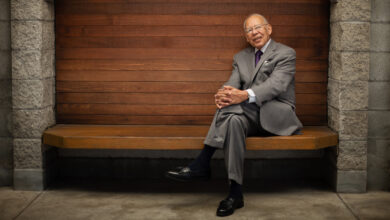Alistair Begg Meets the Politically Correct

This piece was adapted from Russell Moore’s newsletter. Subscribe here.
Sometimes we just have to come right out and say it: It’s a shame to see evangelical Christians sell out biblical convictions, caving to sexual immorality and to an anti-Christian worldview, all to keep in step with the demands of a secularized, politically correct elite.
But we’ll talk about the silence around the Paul Pressler case later. First, let’s shift topics and consider the controversy around Alistair Begg.
Alistair Begg is a very conservative Calvinistic pastor with a national audience, one of the most gifted preachers in America, modeling how to go verse-by-verse, book-by-book through the Bible. He’s committed to the inerrancy of Scripture and to a confessional orthodoxy.
And, as you might expect, he holds strongly to the historic Christian sexual ethic, which defines sexual relations as permissible only within the covenant of marriage, the one-flesh union of a man and a woman. If Alistair Begg were to give a lecture on any number of college campuses, he would be shouted down as a “right-wing bigot.” Really, he’s a time-displaced Puritan with a sense of humor and a pretty good golf game.
You would never know all this, though, from the controversy that’s hit Begg from his fellow evangelical Christians this week. He’s being called a sell-out to the spirit of the age. His long-running radio show was canceled from American Family Radio. Folks are asking, “What happened to Alistair Begg?”
At issue is a couple of minutes of advice Begg gave on a podcast to an evangelical Christian grandmother. The woman was grappling with whether she would be sinning to attend the wedding of her non-Christian grandchild, who was marrying outside the bounds of what both the grandmother and Begg would agree is the biblically moral paradigm.
The grandmother and her grandchild were both clear on where the other stood, but the grandmother wondered if attending the wedding would necessarily be an endorsement of the marriage itself. Begg replied that, under those circumstances, he didn’t think it would.
I would—and have—given different counsel. It’s not because Begg and I disagree one bit on what marriage should be. We disagree somewhat on what a wedding is, meaning the ceremony itself. That is no criticism of Begg, since I hold stricter views than probably 90 percent of my fellow evangelical Christians on that point.
I hold to an old-school, almost sacramental, Book of Common Prayer understanding of a wedding, in which the guests are not onlookers but officiants. They are witnesses to the union, in that they are making vows too: to hold the couple accountable to the vows they make to God and to one another. We see echoes of that original understanding in words that sometimes linger, such as these: “If any of you can show just cause why [this couple] may not lawfully be married, speak now; or else forever hold your peace.”
I recognize that my views on weddings aren’t shared in an individualistic 21st-century culture, even by the overwhelming majority of my fellow conservative Christians. It’s why I don’t officiate at lots of weddings—even for couples I love and for whom I am rooting. I won’t marry unbelievers to each other, even though I think that marriage is a creation ordinance, because I don’t think the church has the authority to hold them accountable to their vows. I won’t marry a believer to an unbeliever because I think the New Testament forbids it. And I won’t marry divorced and remarrying couples unless I am convinced that the divorce was under biblical grounds.
Maybe most controversially, I won’t officiate at a wedding where the couple write their own vows—for the same reason I wouldn’t swear someone in with their own oath if I were an officer of a court. It’s not “your” wedding, in my view; it’s ours, that of the church connecting generations across time and space.
That’s not about judging who’s in sin or not in sin. At least in the case of those outside the church, I am explicitly forbidden to do that (1 Cor. 5:9–13). I don’t give much of a thought to what other people do in these cases. I am just trying my best to be faithful to what I think Jesus expects of me, knowing I may well be wrong.
I also realize that my conscience here might be what the Bible would call the “weaker” one (Rom. 14). I just know that, weak or not, I can’t violate it. I can understand why people would disagree with me, and I can see the biblically reasonable case they could make—which is why I don’t expect other people’s consciences to be bound by my scruples on a matter that’s an inference from Scripture rather than a direct and clear command.
For me, this isn’t about refusing to be around people who are “sinning” or who aren’t similarly minded. I would be a part of almost any other gathering with people who disagree with me on every element of morality—housewarming parties, Thanksgiving dinners, birthdays, anniversaries, funerals, all of it. With a wedding, however, the distinction I make personally is similar to the one I make about those of different religions altogether.
My conscience is completely unhindered to tell my Muslim friends “Happy Ramadan” or my Hindu friends “Happy Diwali.” In those cases, what I am wishing is that they enjoy their time with their families and that they feel rested from their time of celebration. I don’t think there’s anyone in my friend group who infers from that, “Wait. Is he trading in his New Testament for a Quran?” or, “Hold on. Is Ned Flanders over there cool with Krishna now?” The story would be different, however, if I were asked to light the candles at a Druid nature dance.
This tension is present in the New Testament itself. The apostle Paul tells one group of people to eat whatever is in front of them without interrogating whether the meat has been sacrificed. His reasoning is that there’s no such reality as the gods being worshipped; it’s just food (1 Cor. 10:23–33). For other people, though, his command is not to eat meat offered to idols because to do so would be to participate in communion with unclean spirits (1 Cor. 10:19–22). What is the difference?
It’s this: To violate conscience—to intend to do something one knows to be wrong—is a sin. To lead others to do the same—to do what they know to be wrong—is also. The food is all the same. What matters is the message one is intending to communicate to oneself, to one’s struggling brothers and sisters, and to the watching world.
So back to Begg. Sometimes I see in certain people, whose views I don’t hold, reasoning that is more Christlike and more commendable than my own, even when I’m not persuaded they are right.
Begg was not trying to compromise or to condemn. He was trying to hold in tension two very biblical truths; he was trying to avoid conforming to the pattern of this world when it comes to obeying God. And he was trying to avoid being the kind of person who says that it’s beneath one’s purity to “eat with tax collectors and sinners” (Mark 2:16), the very charge that the very religious made of the Lord Jesus himself.
Might Begg be drawing the line in the wrong place—too much in the direction of showing grace? Sure. Might I be drawing it in the wrong place—too much in the direction of maintaining truth? Again, yes. He risks confusing people. I risk hurting people. That’s why I think we both attempt to sort these out with fear and trembling and a willingness to be corrected.
I am often haunted by a conversation I had years ago, in the foyer of an Oklahoma church, with the born-again Christian parents of a lesbian daughter who recently had invited them to her wedding.
The mother went to the wedding and was now tortured by a conviction that she had sold out Jesus. The father didn’t go and was tortured by a conviction that he had sold out his daughter—that he had rejected the role of the merciful father in Jesus’ parable for that of the judgmental elder brother (Luke 15:11–32). Both were sobbing, and both feared what would be said to them at the judgment seat.
The truth is, what the father was trying to do (not going against his conscience; not letting natural affections trump gospel fidelity) is a good and Christian thing. What the mother was trying to do (to love her daughter, even in disagreement; to not expect external conformity from her daughter in the place of knowing Jesus himself) is also good and Christian. The man’s love for his daughter was clear in that moment. The woman’s commitment to Christ was too.
Both were un-Christlike in only one area: They were both unduly harsh and judgmental—not on their daughter but on themselves. Do I really think that Jesus will condemn either of them who were trying their best to do what would please him, even if one or both of them got it wrong? No.
But not long after that conversation with those Oklahoma parents, I found myself accused of “compromise” on these matters. I said that parents shouldn’t shun their gay or lesbian kids. They shouldn’t kick them out of the house or exile them from their family or treat them differently than they would a son who’s been having sex with his girlfriend or a daughter who’s become an agnostic.
Love your children, I said. Let your relationship with them be determined by what Jesus would have you do, not by whether the Christians around you will judge you. Be the loving, prodigally merciful father in Jesus’ parable, not the resentful older brother.
One of the first people to attack me for this as going “soft” on “the gay agenda that’s destroying our nation” was a leader in the mythology of my family of churches, one of two who “rescued” our denomination from “liberals,” who stood up for the inerrancy of Scripture and biblical values.
This was not the first or the last time I would be lambasted by him. I said the Confederate flag should come down; he literally screamed at me from the floor of our denominational meeting. I said that if the allegations about politician Roy Moore (no relation; seriously, no relation) were accurate—that he had sexually pursued underage girls—then he should be disqualified from any office of public trust. Pressler then organized people to let me know that I should apologize to the other Moore, even as some of his supporters were defending these creepy alleged actions as analogous to Joseph’s union with Mary.
I never apologized. And I ended up in two eight-hour or so “heresy trials” over my “compromise” on “biblical sexual morality.”
Pressler is back in the news again, of course, having recently settled a civil case in which he is accused of raping or sexually abusing multiple men and boys. The documents in the case are nauseating, both in terms of the horror of the allegations and of all the ways that Pressler’s people purportedly made it possible for him to use his position for such damnable actions. And the whole time such things had allegedly been happening, he had been a warrior for biblical sexuality, boldly taking on “liberals” like me.
The last joke I ever heard him tell, in some forum or other, was about why Episcopalians could never win at chess. “They can’t tell the difference between a bishop and a queen,” he said.
Oh.
Reported documents show that one of the main entities I had to sit in “trial” for due to my “liberalism” was informed by its own lawyers, when they were named a party in the Pressler case, that the evidence was so overwhelming that they could argue the case only on statute of limitations grounds.
Meanwhile, some of these same people said that those of us suggesting we had a crisis of church sexual abuse were making it up—that we were “liberals” not responsible enough to “protect the base.” And sexual abuse survivors were treated even worse. Even now, that entity has filed an amicus brief in yet another case with a different alleged sexual predator, this time opposing lengthening of statute of limitations for those attacked by rapists and abusers in churches.
With alleged child molesters and rapists, we were to show “forgiveness” and to speak very cryptically. We were supposed to be “soft,” to “compromise.” Where we were supposed to be loud and condemnatory was not with those using the name of Jesus to rape and to abuse but with anguished parents who wanted to love Jesus and their gay or lesbian kids at the same time. That this didn’t—and doesn’t—make sense to me is evidence, I suppose, of all of my compromised liberalism.
Some people who are upset about Alistair Begg’s advice are upset in good faith. They believe that there are consequences to this kind of counsel, which could erode faithful Christian witness. Fair enough.
For others, though, the issue isn’t what the Bible teaches or doesn’t teach. The issue is instead about what really matters to them: politics and cultural outrage. For some, that’s the actual religion.
That’s why some of the same people seeking to “cancel” Alistair Begg are also seeking to “cancel” evangelical Christians who believe the jury when they find a certain person is liable for raping a woman in a department store (along with giving testimony reaffirming that it’s true, “unfortunately or fortunately,” that stars have been allowed to sexually assault women). Many of those who throw stones at Begg are the very same people who spent a lifetime promoting people like Paul Pressler and who stay strangely silent about how repeated reports suggest him to be a monster.
Jesus pointed out that John the Baptist came teetotaling and fasting and people said he was demon-possessed, while Jesus himself came feasting and drinking and they said he was a glutton, a drunkard, and “soft” on tax collectors and sinners (Matt. 11:16–19). The heresy hunters, Jesus said, expected people to dance when they played a happy tune and to cry when they played a sad one. Jesus, though, wasn’t listening to that kind of music.
I wouldn’t attend a wedding outside my beliefs of what marriage is meant to be, but let’s be clear about what we’re dealing with here.
A parent might choose to attend a wedding because they love their child, with whom they disagree. At the same time, the “good Christians” condemning them might remain silent about actual rape, using the name of Jesus to find victims, because those who are silent so love their political tribe. I might disagree with both, but, given the choice, I would hope I would choose the former every time.
To shape one’s moral views by a mob—whether the mob of an ambient culture or the mob of an outraged subculture—is always a betrayal of Christ. Sometimes we compromise the truth of Christ by the way we stand boldly for morality only after we’ve checked whether the immoral is one of “us” or one of “them.”
That seems like cultural compromise to me. You might even call it keeping up with the politically correct. Just don’t call it Christian.
Russell Moore is the editor in chief at Christianity Today and leads its Public Theology Project.




